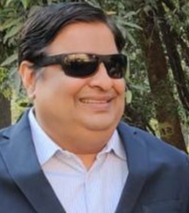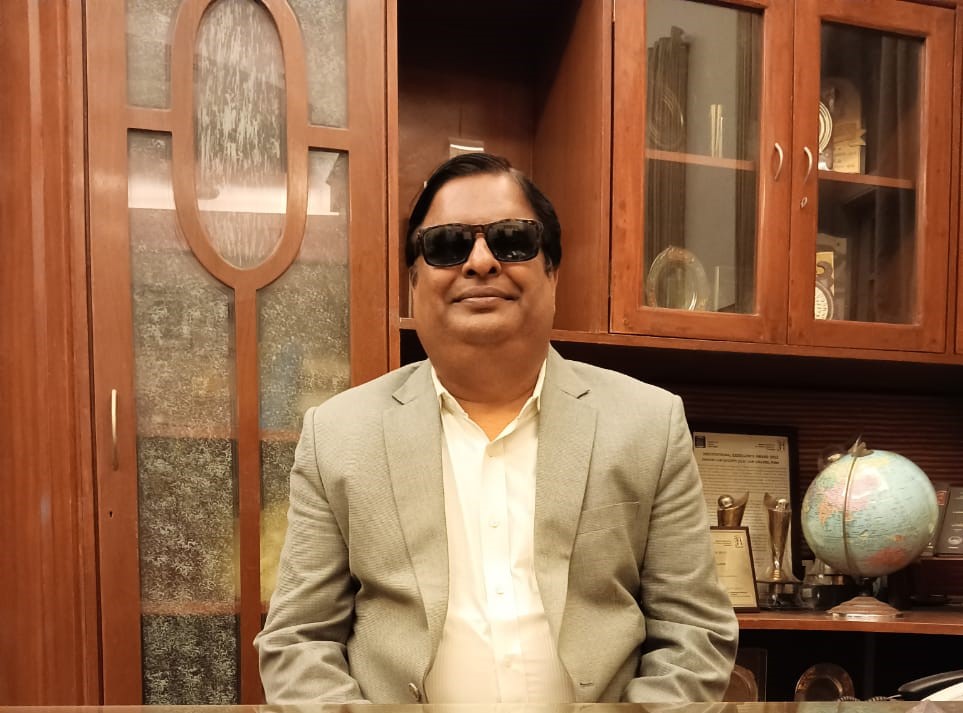Meet Our New Faculty | Dr. Sanjay Jain
June 10, 2022
Ahead of a new Academic Year, we are pleased to welcome Dr. Sanjay Shrikant Jain who has joined NLSIU as Professor of Law. He has a vast teaching experience of 25 years across institutions including the Postgraduate Department of Law, University of Nagpur; Savitribai Phule Pune University; Bharti Vidyapith’s New Law College, Pune; MP Law College, Aurangabad; and most recently the ILS Law college, Pune where he taught for 14 years and also held additional charge as Principal from 2020-2022.
Dr. Jain self-identifies as totally blind* since birth, and is a passionate disability rights activist. In 2004, he received the National Award in the ‘Employee Category,’ instituted by the Ministry of Social Justice and Empowerment, from former President of India, Dr. A.P.J. Abdul Kalam.
Recently, his scholarships have been cited by Hon. Justice D Y Chandrachud, Supreme Court of India in (i) Vikash Kumar v Union of India Feb 2021, which held that an individual suffering from dysgraphia or writer’s cramp is entitled to a scribe in the Civil Services Examination; and (ii) The State of Jharkhand V Brahmputra Met. Ltd. Dec 2020.
In this interview, he tells more about his interests and his work.
(*As a disability rights activist, Dr. Sanjay Jain prefers to be identified as “totally blind” as there are different kinds of visual impairments. Hence, the term used above has been linked to a web page explaining the various kinds of visual impairments for awareness. The article has been written keeping in mind the viewpoints that Dr. Jain has expressed.)
 1. Can you tell us more about yourself and your background?
1. Can you tell us more about yourself and your background?
I hail from Nagpur where I did my initial years of schooling and later attended the Model School for Visually Handicapped at Dehradun. It was my father’s desire that I study at good schools and I am grateful to him as the Model School made me very robust, strong, and confident; it taught me to lead a life of dignity and self-respect.
A story I want to share with all disabled students: I did my higher secondary education at Nagpur where I opted for English medium in Class XI but found it challenging at the time and switched to Hindi medium in Class XII. When I enrolled for the LLB programme at RSTM University of Nagpur, the medium of instruction was English and several people took me very lightly in the first year. However, when I stood second in the order of merit that year, people realised that I am not blind in terms of my competence. We need to conduct ourselves in a manner such that disability should not become a burden on others nor should it become a burden on us. Luckily for me, my friends and batchmates too were very supportive.
I then went on to pursue LLM with a specialization in constitution and administrative law, and a PhD in Law from the University of Nagpur.
2. What are your primary areas of interest and teaching?
My main subjects are constitutional law, and jurisprudence – I will be teaching these courses at NLS for students of the BA LLB (Hons) programme. In the past, I have also taught courses on statutory interpretation, human rights and international law, international economic law, and administrative law.
I find that electives are a very good incentive to do something different and think out of the box. I had also taught an elective on ‘Law and ableism’ at NLS in 2021. I am interested in being experimental with constitutional law and jurisprudence, and tailor these subjects with other subjects, as this is an era of interdisciplinarity. However, my passion and cup of tea is disability rights and this will be a factor in whatever I do.
3. What do you enjoy teaching?
It is very difficult to make a choice between jurisprudence and constitutional law because there is jurisprudence in the constitution, and there is constitution in jurisprudence. I would say jurisprudence is a more challenging subject as it enables one to think beyond the conventional bounds and challenges the existing mindset.
Inspired by my teacher: I want to replicate my teacher Prof Shirish Deshpande in all respects, including his style of teaching. Prof Deshpande was blind and a prolific scholar in Comparative constitutional law who taught me during my LLM at the University of Nagpur. While teaching jurisprudence, he would connect the subject to the realities and to our contexts. Instead of posing as a big scholar with big words, he would make the subject accessible and student friendly. There is an impression that jurisprudence is an elitist subject; this impression was completely banished by him with his fantastic way of teaching. That is what I too want to continue while teaching jurisprudence.
4. Thoughts on visual impairment and your journey so far:
While applying for the position of a teacher or a lecturer, blind people get asked the question of “How will you control the class?” and this upsets me. Why focus on what I lack rather than what I have? I feel class control has nothing to do with eyesight, and more about how one conducts the class. I personally never faced a challenge in the classrooms. One dialogue I often tell my students is that I have 100 eyes and 200 hands! Also, one cannot expect a completely regimented and disciplined classroom; it is not a jail and the teacher is not a policeman.
Luckily, I had great examples among law faculty such as Prof Deshpande, and Prof D W. Wadegaonkar (a blind Jurist and former Principal of Government Law College, Mumbai), who proved the ability of blind teachers. ILS Law College too gave me everything I wanted and allowed me to experiment with many new initiatives.
Words of advice to those with disabilities: My advice is don’t hold back. Try to respond, but don’t be confrontational. The issue with confrontation is that when one tries to make the point louder than necessary, one gets labelled. It is better to be cool and polite, but never lose conviction. You have to ensure that you do not give up, and at the same time, not be disproportionately impolite. And the onus is more on us to be confident.
 5. Your thoughts on joining NLSIU:
5. Your thoughts on joining NLSIU:
My teacher’s dream was my dream: Prof Deshpande’s desire was that I should teach at a law school, and more so at NLSIU. And I am very overwhelmed that when I got my chance to teach at NLS, Sir is unfortunately not here; he passed away one year ago. He would have been very happy.
He would say to me: “If people like you and I make it to the law schools, it is an opportunity for other young disabled law scholars to also join law schools.”
Continuing my academic journey at NLS: Although I reached the position of a principal at ILS, my main thirst has always been academics. At NLS, I will make efforts and pedagogic modifications to ensure that constitution in action, and jurisprudence as translated in realities of life, is delivered to students. As a teacher, I don’t think my job is to sharpen the already sharpened minds but to be approachable to those who need me the most and to cater to their needs.
My first impressions here: I would like to say from the bottom of my heart that I have not experienced the kind of accommodation NLS has given me, in other places. This is unprecedented. I am very happy about this.
I believe nobody wants to discriminate intentionally. But many a time, it occurs because the structure/system doesn’t take cognisance of needs of those different from others. The 100% genuine effort made by NLS to ensure that I am accommodated and welcomed is overwhelming. This genuineness should be there in all institutions, and I can tell with personal experience that it isn’t there in most of them.
6. What do you look forward to at NLSIU?
Now that my accommodation is done, the accommodation of my other disabled brothers and sisters is my next concern. It seems like NLS is already on the right track; I heard that we have disabled-friendly software and also plans of improving accessibility through new signages and a tactile path. I personally would like NLS to become a model for all law schools in India on accessibility. Going forward, I hope there will be conversations that will help us move in that direction.
Accessibility must happen with patience, optimism, and constructive dialogue. I believe that for anything to be done for the disabled, the mantra should be “Nothing about us without us.”
7. Could you highlight some of your key projects/publications?
Projects:
- I recently completed a situational analysis as part of a project funded by ICSSR Delhi under special call of Covid-2019. The project is titled “Socio-legal, Economic and psychological Implications of CORONA on the Lives of persons with Disabilities in general and visually challenged persons in particular in Pune district: An empirical and Situational Analysis.” I was the Project Director and have submitted the final report in May 2022.
- I am currently working on a prestigious project on “Inclusive Public Space: Law, Universality and Difference in the Accessibility of Streets” where I have been nominated as the Country Advisor for India. It is a cross-country study of the right to accessibility of PWDs involving six nations from Europe, Asia and Africa. The project has been funded by the European Research Council for 2020-2023, and is led by Professor Anna Lawson from the University of Leeds. We will be working with a focus on the intersection of age, disability and pregnancy.
Aim of this project: If I were to put it constitutionally – to recognise the right to freedom of movement as a fundamental right in every city, we have to make this right realisable by ensuring rights, and enabling conditions for a barrier free environment. We need to not only practise universal design, but also exercise the principle of reasonable accommodation – individualisation when it comes to needs of particular persons, and generalisation when it comes to addressing other groups.
We are trying to send out a message: Don’t assume that people with disabilities should stay indoors; we need accessible public space for all.
Publications:
- Editing the ‘Revision of M P Jain Indian Constitutional Law” along with Hon Justice Manish Pitale
- Edited ‘Indian Constitution’ – V.D. Mahajan.
- Edited a very interesting book in memory of Prof Shirish Deshpande titled Critical Essays on Disability Rights Jurisprudence ‘Combating Exclusion, Embracing Inclusion’ published by Bloomsbury in 2022.
- Co-edited ‘Basic Structure Constitutionalism : Revisiting Kesavananda Bharati” Ed. Dr. Sanjay Jain and Sathya Narayan, EBC 2011
Dr. Jain concluded the interview with one of his favourite quotes: “Everybody is a genius, but if you judge a fish by its ability to climb a tree, it will live its whole life believing that it is stupid.” – Albert Einstein

